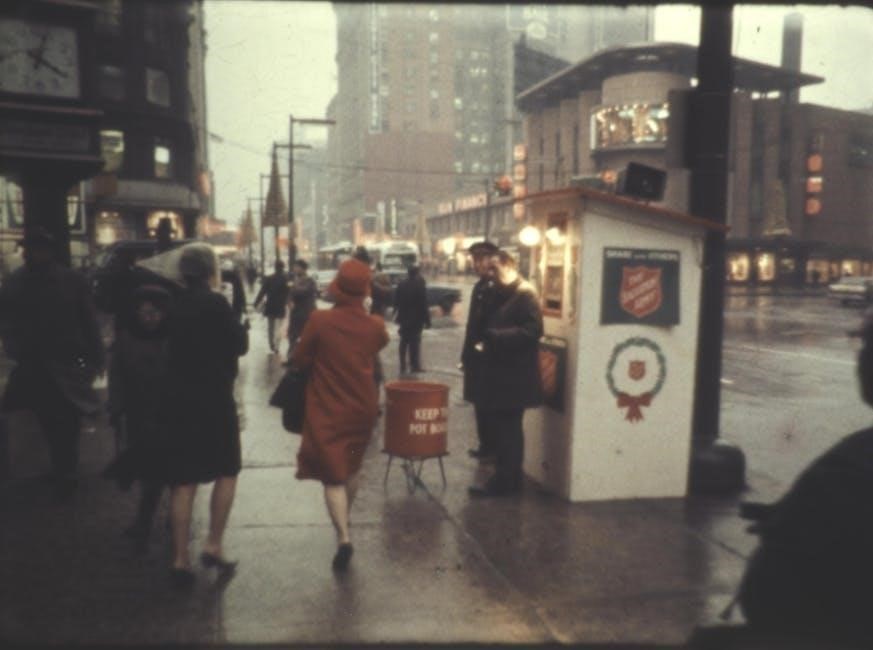salvation army donation guide printable
The Salvation Army Donation Guide is a comprehensive resource to help donors contribute effectively. It offers insights into acceptable items, preparation tips, and maximizing impact through charitable giving.
Overview of the Salvation Army’s Mission
The Salvation Army is a global nonprofit organization dedicated to meeting human needs through compassionate service. Its mission focuses on supporting vulnerable populations, including the homeless, disaster survivors, and at-risk youth. By providing food, shelter, rehabilitation programs, and disaster relief, the Salvation Army aims to uplift communities and promote dignity. Donations play a vital role in funding these efforts, ensuring assistance reaches those in greatest need.
Importance of Donations for Community Support
Donations to the Salvation Army are crucial for supporting community programs and services. They fund food distribution, shelter for the homeless, and youth development initiatives. By contributing, donors directly help improve lives and strengthen local communities. Every item or dollar donated enables the Salvation Army to address urgent needs and provide hope to those facing challenges, creating a lasting positive impact.

Understanding What Items Are Acceptable for Donation
The Salvation Army accepts a variety of items, including clothing, furniture, and household goods. Ensure items are in good condition to support their resale and reuse programs effectively.
Common Household Items Accepted
The Salvation Army accepts a variety of household items, including gently used clothing, furniture, kitchenware, linens, books, media, and toys. These items should be in good condition to ensure they can be effectively reused or sold to support community programs. Donors are encouraged to check the condition of their items before donating to maintain quality and usability for those in need. This approach helps reduce waste and supports sustainable practices while aiding individuals in need. By donating these items, you contribute to creating a positive impact in your community. Always ensure items are clean and functional to maximize their benefit to others.
Items Not Accepted and Why
The Salvation Army typically does not accept damaged, soiled, or hazardous items, such as broken furniture, stained clothing, or expired goods. Large appliances, mattresses, and construction materials are often refused due to logistical challenges and safety concerns. Items like computers, phones, and chemicals may also be declined because they require special handling or contain sensitive information. Ensuring items are in usable condition helps maintain safety and efficiency in their donation process.

How to Prepare Your Donations
Inspect items for damage or stains, clean thoroughly, and ensure electronics function properly. Organize donations by category and pack securely to simplify processing for the Salvation Army.
Tips for Cleaning and Organizing Donations
Clean and inspect all items before donating. Remove stains, wash clothing, and test electronics to ensure functionality. Separate items into categories like clothing, furniture, and household goods for easier processing.
Pack items securely in boxes or bags, labeling contents clearly. This helps the Salvation Army distribute donations efficiently, ensuring they reach those in need quickly and effectively.
How to Categorize Donations Effectively
Categorizing donations ensures they reach the right recipients efficiently. Separate items into groups like clothing, furniture, and household goods. Within clothing, organize by type (e.g., tops, bottoms) and size. For furniture, note condition and functionality. This helps the Salvation Army process and distribute donations effectively, ensuring they meet specific community needs promptly.
Use clear labels and maintain organized collections to streamline the donation process.

Maximizing Your Donation’s Impact
Maximizing your donation’s impact involves ensuring items are high-quality and meet specific community needs. Quality donations directly support those in need through the Salvation Army’s programs and services.
Quality Over Quantity: Why It Matters
Donating high-quality items ensures they can be effectively used or sold to support community programs. Poor-quality or damaged items often cannot be sold and may end up in landfills, wasting resources.
By focusing on quality, you help the Salvation Army provide meaningful assistance to those in need, making your donation more impactful and beneficial to the community.
Donating During Peak Demand Seasons
Donating during peak seasons, such as winter or disaster relief periods, ensures your contributions meet urgent community needs. Items like warm clothing, blankets, and emergency supplies are in high demand during these times.
Aligning your donations with seasonal requirements maximizes their impact, helping the Salvation Army provide timely assistance to those in crisis. Your thoughtfulness can make a significant difference during critical periods.

Tax Benefits of Donating
Donations to the Salvation Army are tax-deductible, offering financial benefits while supporting community programs. Use their valuation guide to determine deduction amounts for your contributions.
How Donations Can Be Tax-Deductible
Donations to the Salvation Army are tax-deductible, providing financial benefits while supporting community programs. Items like clothing, furniture, and household goods qualify. Use the Salvation Army’s valuation guide to determine the deductible value of your contributions. Keep receipts and documentation for accurate tax filings, ensuring compliance with IRS guidelines for charitable donations.
Using the Salvation Army’s Valuation Guide
The Salvation Army’s Valuation Guide helps donors estimate the fair market value of their contributions. It provides detailed benchmarks for items like clothing, furniture, and household goods. This resource ensures accurate valuations for tax purposes, making it easier to document donations. The guide is printable and user-friendly, simplifying the process of determining the value of your charitable contributions efficiently.
The Importance of Receipts for Tax Purposes
Receipts for Salvation Army donations are essential for tax deductions. They serve as proof of your contribution, ensuring compliance with IRS requirements. A detailed receipt helps verify the value and nature of your donation, making it easier to claim deductions during tax filing. Always request and keep receipts for all donations, as they are crucial for tax purposes and record-keeping.
Salvation Army provides receipts upon request, which can be used to document your charitable giving. These receipts are valid for tax-deductible donations and help ensure transparency in your contributions. Keep them organized and secure, as they are indispensable for accurately reporting your donations to the IRS. This step is vital for maximizing the tax benefits of your generosity.

Finding the Nearest Salvation Army Donation Center
Receipts for Salvation Army donations are essential for tax deductions. They serve as proof of your contribution, ensuring compliance with IRS requirements. A detailed receipt helps verify the value and nature of your donation, making it easier to claim deductions during tax filing. Always request and keep receipts for all donations, as they are crucial for tax purposes and record-keeping.
Salvation Army provides receipts upon request, which can be used to document your charitable giving. These receipts are valid for tax-deductible donations and help ensure transparency in your contributions. Keep them organized and secure, as they are indispensable for accurately reporting your donations to the IRS. This step is vital for maximizing the tax benefits of your generosity.
Using Online Tools to Locate Centers
The Salvation Army offers convenient online tools to find the nearest donation center. Visit their official website and use the “Find a Location” feature, allowing you to search by ZIP code, city, or state. This tool provides addresses, contact information, and operating hours. Additionally, some centers offer online scheduling for donations, making the process efficient. Use these resources to quickly locate a center near you and contribute seamlessly.
How to Contact Local Centers for Information
To contact local Salvation Army centers, visit their official website for a directory of locations. Each center’s page provides phone numbers, email addresses, and physical addresses. Call or email directly for inquiries about donation guidelines, drop-off hours, or specific needs. Additionally, the Salvation Army’s national hotline (2-1-1) offers 24/7 assistance, connecting you to local services and resources. This ensures you receive accurate, tailored information for seamless donations.

Special Donation Programs
The Salvation Army offers specialized donation programs, including disaster relief and youth-focused initiatives, allowing donors to direct their contributions to specific community needs and causes.
Disaster Relief and Emergency Assistance
The Salvation Army provides critical support during disasters, offering shelter, food, and emotional care. Donations of blankets, hygiene kits, and non-perishable foods are vital for disaster relief efforts. These contributions help victims recover and rebuild, ensuring communities receive immediate aid in crises. Your support enables the Salvation Army to act swiftly, delivering essential resources to those in need during emergencies and disasters.
Donations for Specific Causes: Youth Programs
Donations to Salvation Army youth programs support after-school activities, summer camps, and mentorship initiatives. These programs foster education, character development, and physical well-being in children. Your contributions fund educational materials, sports equipment, and safe spaces for kids to thrive. By donating, you help build confidence and provide opportunities for young people to succeed, creating a brighter future for the next generation.

Common Mistakes to Avoid When Donating
Avoid donating damaged or soiled items, as they cannot be used. Ensure all items are in good condition and meet the Salvation Army’s acceptance criteria.
Donating Damaged or Soiled Items
Donating damaged or soiled items is discouraged, as they cannot be sold or reused effectively. These items often end up in landfills, wasting resources and increasing costs. Ensure all donations are clean, functional, and in good condition. The Salvation Army accepts items like gently used clothing, furniture, and household goods but rejects items that are broken, stained, or unsafe. This helps maintain the quality of products sold in their stores and supports their mission to fund community programs.
Forgetting to Obtain a Donation Receipt
Forgetting to obtain a donation receipt can prevent you from claiming tax deductions for your contributions. The IRS requires documentation for charitable donations, and the Salvation Army provides receipts upon request. Ensure you ask for one when dropping off items or scheduling a pickup. Without it, you may lose the opportunity to benefit from tax deductions, even for eligible donations. Always keep receipts organized for tax purposes.
Scheduling a Donation Pickup
Schedule a donation pickup online or by phone. Ensure items are eligible and prepared. This service is convenient for large items and supports community programs effectively.
How to Arrange for Furniture and Large Items Pickup
To arrange for furniture and large item pickup, visit the Salvation Army’s website and use their online scheduler. Provide details about the items and preferred pickup date. Confirm eligibility and prepare items according to guidelines. Ensure clear access for the pickup team. A confirmation email or call will follow. This service is convenient and supports local community programs, making your donation process seamless and impactful.
Benefits of Using Pickup Services
Using Salvation Army pickup services offers convenience, saving time and effort. It allows donors to easily contribute large or bulky items without transportation hassles. This free service supports community programs and helps reduce landfill waste. Scheduling online is quick and straightforward. By utilizing pickup services, donors directly aid vulnerable populations while ensuring items are responsibly repurposed. It’s an efficient way to make a meaningful impact.

Seasonal and Holiday Donation Considerations
Seasonal donations help meet urgent community needs during holidays and winter months. Coats, blankets, and gifts are in high demand, supporting vulnerable populations and spreading hope effectively.
Winter Clothing and Blankets
Winter clothing and blankets are essential donations, especially for homeless individuals and families in need. Coats, gloves, scarves, and warm blankets provide critical support during colder months. Donating these items ensures vulnerable populations stay safe and warm. The Salvation Army prioritizes such donations to address urgent winter needs and distribute them where they are most needed. Your contribution helps combat cold weather challenges effectively.
Holiday Gifts and Toys for Children
Holiday gifts and toys for children are deeply appreciated donations, bringing joy to families in need. Consider donating new, unwrapped toys, games, and books to support holiday programs like Angel Tree. Gently used items in good condition are also welcome. These contributions help create a brighter holiday season for children and families, ensuring everyone feels valued and supported during this special time of year.
Getting Involved Beyond Donations
Volunteering and participating in fundraising events are great ways to support the Salvation Army’s mission. Your time and skills can make a meaningful difference in the community.
Volunteering Opportunities
Volunteering with The Salvation Army offers diverse ways to give back. From assisting with food and clothing distribution to supporting community events, your time and skills can make a difference. Opportunities include helping at shelters, organizing donation drives, and participating in disaster relief efforts. Contact your local Salvation Army center to explore roles that match your interests and availability. Every hour contributed helps transform lives and strengthen communities.
Participating in Fundraising Events
Participating in fundraising events for The Salvation Army is a great way to support their mission. Events like charity runs, auctions, and holiday galas bring communities together while raising vital funds. Your involvement, whether through attendance, sponsorship, or organizing, provides invaluable support for their programs. These events not only help fund essential services but also raise awareness about the needs they address. Check local listings or the Salvation Army’s website to find and join upcoming events near you.
By following this guide, you can make a meaningful impact through your donations. Remember, every item and effort supports vital community programs and services.
Final Tips for Effective Donations
Ensure all items are clean and functional, as quality donations make the greatest impact. Consider seasonal needs, like winter coats or holiday gifts, to maximize your contribution. Use the Salvation Army’s valuation guide for tax purposes and always request a receipt. Double-check local guidelines and contact centers directly for specific requirements. Your thoughtful donations can transform lives and strengthen communities.
Encouragement to Use the Printable Guide
Utilize the Salvation Army’s printable donation guide to streamline your giving process. This handy resource helps you determine item values, organize donations, and understand tax benefits. It also simplifies scheduling pickups and ensures you have the necessary receipts. By using the guide, you’ll make a meaningful impact while staying informed and organized. Make your donations count with this essential tool!